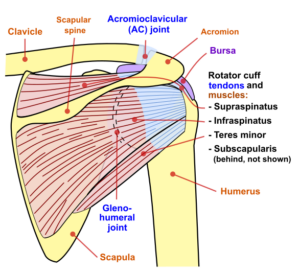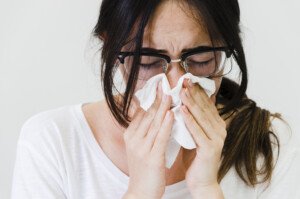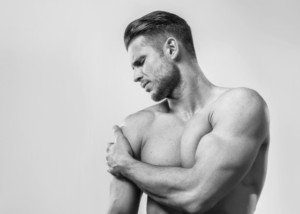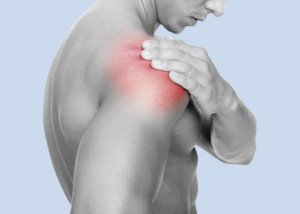When you sneeze does your rotator cuff hurt?
Do you feel pain on the side of your upper arm when you sneeze?
The odd thing about this is that you may not necessarily feel discomfort doing common tasks such as housework or even with most of your strength training.
The situation is as follows: Your shoulder area or rotator cuff (a group of four tendons) may feel perfectly fine in the activities of daily living.
You can strength train, even, without any issues, though there may be some moves that you make a point of avoiding such as the flat bench press, the flat dumbbell press and the dumbbell side raise.
You feel a sneeze coming on. As you expel the air, that’s when you feel a brief “pain” that’s the same type of discomfort that occurs if you strain your rotator cuff in a gym exercise.
After the sneeze, everything feels normal.
How a Sneeze Irritates the Rotator Cuff

Rotator cuff. Jmarchin, CC
“A tear in the rotator cuff can be painful when sneezing,” begins Dr. Megan McLain, PT, DPT, cofounder of Intuitive Choice Physical Therapy & Wellness in Atlanta, GA.
The tendon, though, need not have a major tear – it can be a microtear.
“When you sneeze, your diaphragm contracts forcefully to get air out of your lungs in order to clear your airways of debris,” continues Dr. McLain.
“When this happens, some of this force will go into the shoulder, because your shoulder blades sit along your ribcage.
“One of the primary functions of the rotator cuff is to provide stability to the shoulder.
“The rotator cuff is actually four muscles; two sit on the back of the shoulder blade.
“One sits on the front of the shoulder blade, and one crosses the top of the shoulder.
“All of them forcefully contract together in varying amounts to stabilize your shoulder in its shallow socket during a sneeze.
“This is why if you have a tear or tendonitis [inflammation] in your rotator cuff, it can be painful when you sneeze.
“To avoid excessive pain, try to cover your nose with the hand on the side that does not have a rotator cuff tear or tendonitis.”
 Dr. Megan McLain, PT, DPT, puts her clients first while providing one-on-one in-home care. With physical therapy and health coaching services, Dr. McLain addresses all aspects such as physical barriers, mindset, accountability and knowledge that may be impacting the client’s experience.
Dr. Megan McLain, PT, DPT, puts her clients first while providing one-on-one in-home care. With physical therapy and health coaching services, Dr. McLain addresses all aspects such as physical barriers, mindset, accountability and knowledge that may be impacting the client’s experience.
 Lorra Garrick is a former personal trainer certified by the American Council on Exercise. At Bally Total Fitness she trained clients of all ages for fat loss, muscle building, fitness and improved health.
Lorra Garrick is a former personal trainer certified by the American Council on Exercise. At Bally Total Fitness she trained clients of all ages for fat loss, muscle building, fitness and improved health.
.



























